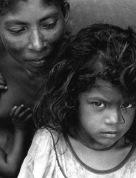
Fables of Birth| 51mins
Director: Sahana Bhattacharya | Producer: Sahana Bhattacharya
Focus Years: 2007 | Country: India
Synopsis:
Synopsis
An intimate glimpse into a disappearing world :
In the remote and forgotten villages of Eastern India, separated from civilization by a vast roadless plain, Dai is delivering a baby exactly as her ancestors would hundreds of years ago. She is a midwife and in this region that is to be a representative of an ancient and mysterious art, often employing methods unthinkable to us in the West. Our heroines, two ancient and delightful midwives, are never short of a saucy joke - or a wise word. Humorous and uplifting."All that's needed is Manjura, some twine, a coin and a blade", Manjura says as she firmly but delicately winds the twine around the baby's umbilical cord. The feisty 62 year-old Manjura is a torchbearer of the midwifery tradition in this region. She lays the child on her knees and rubs the screaming infant with mustard oil, believed to cleanse the baby of the impurities associated with childbirth. To break the tension Manjura cracks a joke to the watching children. However she doesn't have the same patience with the cameraman; "even our chatting is being captured by you. What a smart ass you are!"
While Western knowledge and hospitals remain a distant dream to the people of this area, the experience and knowledge of childbirth held by Manjura and the other travelling midwives, is gold dust to expectant mothers here. The women travel daily by foot, providing assistance and reassurance. The combination of fierce pride and confidence, and their humorous and jovial nature, make them an invaluable to the nervous mothers to be. "Once you get married you'll realise the fun of it all", Kalindi suggestively tells us with a cheeky grin on her face.
In this world, a far cry from civilisation, most of the practices of the midwives remain shrouded in mystery and superstition. But in this heart warming documentary we are given an insight into practices far outside the remit of Western medicine. As she leans over the baby, Manjura administers the slicing act, piercing the baby's skin at certain points with a scythe. Upon being questioned about it Manjura flies into a rage, "it's to prevent enlargement of the spleen", she says, fiercely defending the rite. Doctors frown on it but the traditional midwives insist it combats the problems they face from a poor diet. It is not only with babies that they have unique practices, which have evolved through the generations. "We know special roots and weeds which prevent conception", say the old ladies laughing at our ignorance. Yet they refuse to say more and do not totally give away their secrets.
The midwives, through their mix of pragmatism and spiritualism, control the realm of childbirth in this remote corner. They are not only midwives but also conjurers of potions, holders of secret knowledge and confidents for frightened mothers. A breathtaking vision of a society on the fringes of civilisation, still reliant on a cultural and traditional memory, to guide them through life's most important rites of passage.
Abiut the film :
The idea behind making a documentary about birth and midwifery in a tribal village in the region of Ayodhya mountains in West Bengal took birth several years ago while shooting the lives of an artisan community in the same region. Some women were confiding in me their preoccupations and worries concerning their pregnancy and motherhood, especially one of them who could not bear children anymore. During the course of our discussions, they talked about birth and how it takes place in an isolated village, the related anguishes and distresses regarding the frequent complications during the birth and the role of the local midwives called as 'Dais'. These discussions made me reach back in time to ponder over my urban existence as a middle class woman in Kolkata where I had my pregnancy and subsequent delivery.
Following that visit, I went back several times to an isolated village in the hills of Ayodhaya named Hesadi where a community of Dais live and work for the surrounding thirty tribal villages. A relation of trust and intimacy grew slowly between these women and me. These women exist in a world that is completely different from that of mine but speak almost the same language as me, Bengali. The relationship was especially strong with Manjura, a seventy-year-old midwife with a strong personality who spoke fearlessly and freely. At first, the Dais were surprised that an alien (Kolkata is around 200 kilometers from Hesadi) could be interested in their little known profession and their everyday life. However, with the passage of time, the barriers of literacy (they were illiterate while I have been to the University), barriers of standard of living (they had nothing while I had the privilege of a decent existence), and barriers of caste (they were untouchables while I was a Brahmin) collapsed. As we started to exchange our womanly secrets, we began to share our intimacy and resultantly, a strong and familiar relationship was formed.
The childbirth, condition of the women and their relation with fertility, the age old practice of the 'Dais' these are subjects that have already been studied before. Such studies chiefly highlighted the existence of poverty, utter lack of hygiene, and the yawning gap that separates rural India from what we term as the developed world. Unfortunately, these studies have not taken into consideration the fact that it would have been interesting to lend an open voice to the midwives to speak their minds.
Fables of birth aims to ensure that these voices are heard, and to pay attention to the experiences of a labouring woman, their sufferings, and their anguishes regarding pregnancy and child delivery.
The midwives belong to the lowest caste of the Hindu society. They are marked as the 'Untouchables'. In Hinduism, birth is fundamentally considered to be an impure event. Everything that is related to the biological roots of a human being is considered to be impure, especially when it concerns women. Midwives, as they work in constant touch with such substances, are seen as existing in a perennial state of impurity by the other castes.
These midwives posses a traditional knowledge which passes on from generation to generation: consisting the ability to interpret symptoms that are indicative of the onset of labour pains, foresee from apparent signs as to whether the delivery would be an easy or a difficult one, maneuver a delivery in squatting position, the post delivery care for the mother and the infant and medicinal concoctions that could facilitate in the birth of a male child or aid in abortion...
The midwives form an essential part of a woman's universe in rural India, a universe where women communicate, sometimes in a language that is riddled with crudeness, only among them and always protected from the scrutiny of the men. This universe that is rarely accessible to outsiders, is consciously brought into the light during the course of this documentary.
Character Sketch :
Manjura, the septuagenarian, lives in a little village in the border of West Bengal and Bihar, named Hesadi. Her profession determined her place at the lowest slab in the Hindu cast system: She is a midwife, locally known as DAI.
Futuna, the daughter in law, a dai, who learnt the practice from her mother in law by accompanying her to the 35 villages around on foot since her early adulthood. under Manjura's tireless handholding and government led training program, Futuna is now confident enough to deliver babies and take care of the welbeing of the mother in distress.
Sephali, at her 25, mother of two girl child, in her acute pre childbirth contractions,
awaiting a boy this time...
Astami, a newly married girl of 17 years, passes through a state of trauma thinking of an eventual death during the delivery of her first child.
Rupa, the grand daughter of Manjura, a student of eighth Standard doesn't want to learn the age-old method of traditional childbirth but projects to become a Nurse.
Fables of Birth
|
51mins
Search information, ideas, subjects related to this story:
Wikipedia :
- Child Birth in India
- Midwifery
- Aid
- Authoritarianism
- Civil Rights Movement
- Conflict Resolution
- Cycle of Poverty
- Diseases of Poverty
- Economic Inequality
- Energy As Medicine
- Epidemic
- Epidemiology
- Esoteric Healing
- Extreme Poverty
- Faith Healing
- Genetics
- Global Poverty Index
- Healing
- Health
- HIV/AIDS
- Homelessness
- Human Body
- Infection
- Malnutrition
- Nutrition
- Oppression
- Oppression Of Women
- Peacebuilding
- Physiology
- Pollution and Its Effects
- Poverty
- Poverty Reduction
- Poverty Threshold
- Power
- Public Health
- Social Control
- Social Exclusion
- Starvation
- Totalitarianism
- Vaccination
- Victimization
Other Articles/Sites :
Send funds to team of this film/project:
NOTE: 100% of your funds are sent directly from here.

Close
This storyteller has yet to share/set a wallet for the direct fund transfers.
Shall we send an email request on your behalf?
Close
peace



